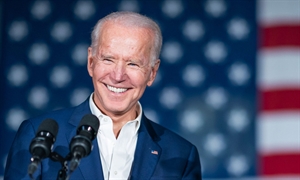Biden inauguration leads to resurgence of US engagement in climate change
Thu 21 January 2021
View all news

Joe Biden's inauguration as President of the United States heralded a flurry of announcements and policy reversals signalling the United States' reengagement with international efforts to tackle climate change.
Within hours of being sworn in as President, Biden signed an executive order re-committing the US to the Paris climate agreement. There was a flurry of further executive orders aimed at tackling the climate crisis, including plans to block the iconic Keystone XL pipeline and halt oil and gas drilling in Utah and the Arctic national wildlife refuge wilderness..
In his inauguration speech, Mr Biden said that America - now the second-largest emitter of greenhouse gases in the world - said America needed to respond to a “climate in crisis”.
The change in direction from the Trump era has been profound and immediate. On the White House website, where all mentions of climate were scrubbed out in 2017, a new list of priorities now puts dealing with the climate crisis second only behind tackling the Covid pandemic.
Todd Stern, who was the lead US negotiator in Paris (quoted by The Guardian) said: “It’s just a huge day to get rid of this myopic, benighted administration and welcome in a new president who manifestly is committed to strong, meaningful action,
“Rejoining Paris is just the first step, but it’s a big first step.”
Biden is expected to convene an international climate summit in the spring to help accelerate emissions cuts and is also expected to submit a new US emissions reduction goal to help it reach net zero emissions by 2050.
The new President also instructed federal agencies to stop plans to weaken future fuel efficiency regulations. An executive order tells federal agencies that environmental justice is a priority—one that will now be guided by scientific evidence.
The order states that the heads of each agency will have to review any regulations, policies, or other actions taken between January 20, 2017 and January 20, 2021 that are inconsistent with that goal.
The Trump administration's attack on clean air and fuel efficiency began almost immediately and culminated with two actions over the past 16 months. In September 2019 the EPA announced that it was revoking a waiver that has allowed California to set and enforce its own tougher air pollution standards within the state's borders. Then, in March 2020, it published a new fuel efficiency rule for passenger cars and light trucks for model years 2021-2026 that significantly weakened fleet efficiency targets mandated by the prior Obama administration.
Now, the EPA has until April 2021 to publish a proposed rule "suspending, revising, or rescinding" the revocation of California's air pollution waiver. And by July 2021, it has to do the same for the widely criticized fuel efficiency rule, with instructions to take into account the views of "representatives from labour unions, states, and industry." Although some companies like GM and Toyota sided with the Trump administration's actions, other car makers voluntarily signed up to California's rules.
Related Links
< Back to news list